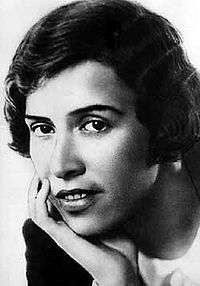Natalya Sats
Natalya Il'inichna Sats (sometimes spelled Natalia Satz; Russian: Наталия Ильинична Сац; 27 August [O.S. 14 August] 1903 – 18 December 1993) was a Russian stage director who ran theaters for children for many years, including the Moscow Musical Theater for Children, now named after her. In 1937, she fell victim to Soviet repressions, but was rehabilitated in 1953.

Biography
Sats was born in Irkutsk, Imperial Russia, where her father, Ilya Sats, was in political exile. Ilya Sats, a composer, grew up in a Jewish family. He was a friend and protege of Leo Tolstoy. Natalya's mother, Anna Sats née Shchastnaya, the daughter of a Ukrainian general, left home as a young woman to become a professional singer in Montpellier where she met Ilya Sats. When Ilya was exiled to Irkutsk, Anna followed him and soon gave birth to Natalya. The two were subsequently married.[1]:Ch.1 The family moved to Moscow in 1904, when Ilya Sats became music director of the Moscow Art Theatre (MAT).
After the October Revolution in 1917, Commissar of Education Anatoly Lunacharsky proposed to start a theater for children, and MAT director Konstantin Stanislavsky recommended the 15-year-old Natalya Sats.[2] Under Lunacharsky's direction, Sats quickly began producing traveling puppet shows on temporary stages around Moscow. Eventually, the government gave her a theatre building in Moscow for her performances. Here she established herself as a stage director and producer and began to attract international attention. In 1931 conductor Otto Klemperer invited her to stage Wolfgang Mozart's The Marriage of Figaro in Buenos Aires, and Giuseppe Verdi's Falstaff in Berlin.[2]
In 1936, Sats commissioned a work that was to change the history of performance for children. As the director of the Moscow Theater for Children, Sats wished to produce a play which would introduce children to the instruments of the orchestra. She commissioned Sergei Prokofiev to compose Peter and the Wolf and worked closely with him on its creation, contributing many ideas to the libretto. Peter and the Wolf premiered at the Moscow Philharmonic on 2 May 1936. Due to illness, Sats was not able to attend this premiere, which according to Prokofiev was not a success. However, three days later, Sats narrated Peter and the Wolf at its first performance in the Moscow Theater for Children. This second performance proved a huge success and effectively launched the work.[1]:215–24 Peter and the Wolf, dedicated to Sats, went on to international success. It has been recorded over 400 times, and translated into many languages. Sats continued to narrate performances of Peter and the Wolf through the rest of her career.
On August 21, 1937 after the arrest of her husband, the Soviet Minister of Trade Israel Veitser, Sats was charged under Article 38 as a "Traitor to the Motherland by association", i.e. being related to a traitor to the Motherland. She was arrested and taken first to Lubyanka prison and then to Butyrka prison. She refused to sign a confession, and was sentenced to five years at a labor camp in Siberia.
At the end of her five years of hard labor, she was not allowed to return to Moscow, but was exiled to Alma-Ata (now Almaty, Kazakhstan). There, in 1944, Sats wrote to the Central Committee about the necessity of a theater for children and young people in the city. A resolution of the Council of People's Commissars and Central Committee of Communist Party of Kazakhstan “On organization of the theater of young spectators in Alma-Ata” was adopted on September 6, 1944. On November 7, 1945, the theater opened with a production directed by Sats.[3]
After Stalin's death in 1953, Sats was fully rehabilitated and returned to Moscow in 1958. Here she ran a touring theater for children. Eventually, with the support of influential colleagues, she was able to start a new theater for children in Moscow. In 1965, the Musical Theater for Children opened. Her theater company traveled the world, performing in many countries and languages.
In addition to working as a playwright, director and producer, Sats wrote three books, including an autobiography Sketches from My Life,[1] which was translated into English in 1985.
For her work, Sats received numerous awards, including USSR State Prize (1972), People's Artist of the USSR award (1975), Lenin Prize (1982), Hero of Socialist Labor medal (1983), and Lenin Komsomol Prize (1985). She was elected a member of the USSR Union of Writers in 1962.
Sats died 18 December 1993, and was buried at the Novodevichy Cemetery in Moscow next to her father. The Musical Theater for Children and the State Theater for Children in Almaty were then renamed in her honor. Sats' daughter, Roksana Sats, continues her work in the theater.[4][5]
Notes
- Sats, Natalia (1979). Sketches from my Life (in Russian). Translated by Syrovatkin, Sergei. Moscow: Raduga.
- Edwards, Bobb (2009-04-14). "Natalya Sats". Find a Grave. Retrieved 30 June 2017.
- See History of the State Academic Russian Theater for Children and Young People named after N. Sats
- "State Academic Russian Theatre for Children and Young People named after N. Sats". Attractions of Almaty. 2013. Archived from the original on 2016-08-07. Retrieved 30 June 2017.
- 40th anniversary of the theater (in Russian)
References
- Simon Morrison, The People's Artist, Oxford, Oxford University Press, 2009.
- Natalya Sats, Sketches from My Life, vol 1, 1984.
- Deborah Annette Wilson, Prokofiev's Romeo and Juliet: History of a Compromise, Doctoral Dissertation, The Ohio State University, 2003.
- Biography (in Russian)
- Peter & The Wolf [VHS], Proscenium Entertainment, released February 26, 1996.
External links
- Natalya Sats, 90, Dies; Children's Opera Head, obituary in The New York Times, December 22, 1993.
- Natalia Sats--Triumph of the Human Spirit, an essay.
- Short biography of Natalia Sats, on the Natalya Sats Musical Theater website.